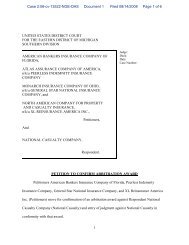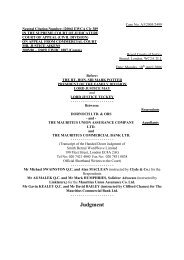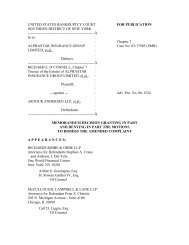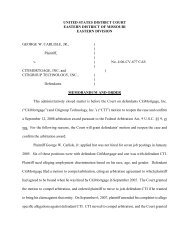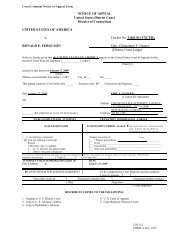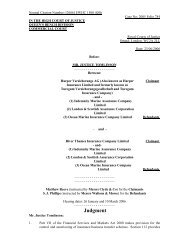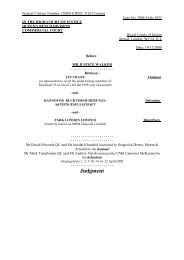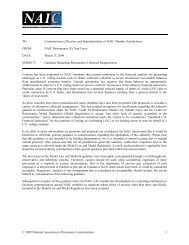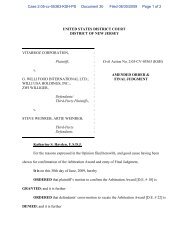Statutory Issue Paper No62R - Reinsurance Focus
Statutory Issue Paper No62R - Reinsurance Focus
Statutory Issue Paper No62R - Reinsurance Focus
Create successful ePaper yourself
Turn your PDF publications into a flip-book with our unique Google optimized e-Paper software.
Property and Casualty <strong>Reinsurance</strong><br />
SSAP No. 62R<br />
58. Items in dispute are those claims with respect to which the ceding entity has received formal<br />
written communication from the reinsurer denying the validity of coverage.<br />
Uncollectible <strong>Reinsurance</strong><br />
59. Uncollectible reinsurance balances shall be written off through the accounts, exhibits, and<br />
schedules in which they were originally recorded.<br />
Commutations<br />
60. A commutation of a reinsurance agreement, or any portion thereof, is a transaction which results<br />
in the complete and final settlement and discharge of all, or the commuted portion thereof, present and<br />
future obligations between the parties arising out of the reinsurance agreement.<br />
61. In commutation agreements, an agreed upon amount determined by the parties is paid by the<br />
reinsurer to the ceding entity. The ceding entity immediately eliminates the reinsurance recoverable<br />
recorded against the ultimate loss reserve and records the cash received as a negative paid loss. Any net<br />
gain or loss shall be reported in underwriting income in the statement of income.<br />
62. The reinsurer eliminates a loss reserve carried at ultimate cost for a cash payout calculated at<br />
present value. Any net gain or loss shall be reported in underwriting income in the statement of income.<br />
63. Commuted balances shall be written off through the accounts, exhibits, and schedules in which<br />
they were originally recorded.<br />
National Flood Insurance Program<br />
64. The National Flood Insurance Program was created by the Federal Emergency Management<br />
Agency (FEMA) and is designed to involve private insurers in a write-your-own (WYO) flood insurance<br />
program financially backed by FEMA at no risk to the insurer. To become a participating WYO entity,<br />
the entity signs a document with the Federal Insurance Administration (FIA) of the Federal Emergency<br />
Management Agency known as the Financial Assistance/Subsidy Arrangement.<br />
65. Premium rates are set by FEMA. The WYO participating companies write the flood insurance<br />
coverage qualifying for the program on their own policies, perform their own underwriting, premium<br />
collections, claim payments, administration, and premium tax payments for policies written under the<br />
program.<br />
66. Monthly accountings are made to FIA and participants draw upon FEMA letters of credit for<br />
deficiencies of losses, loss expenses, and administrative expenses in excess of premiums, subject to<br />
certain percentage limitations on expenses.<br />
67. Balances due from or to FEMA shall be reported as ceded reinsurance balances receivable or<br />
payable.<br />
Accounting for the Transfer of Property and Casualty Run-off Agreements<br />
68. Property and casualty run-off agreements are reinsurance or retrocession agreements that are<br />
intended to transfer essentially all of the risks and benefits of a specific line of business or market<br />
segment that is no longer actively marketed by the transferring insurer or reinsurer. A property and<br />
casualty run-off agreement is not a novation as the transferring insurer or reinsurer remains primarily<br />
liable to the policyholder or ceding entity (in the case of a retrocession) under the original contracts of<br />
insurance or reinsurance. <strong>Reinsurance</strong> agreements between affiliates or between insurers under common<br />
© 2009 National Association of Insurance Commissioners 62-15


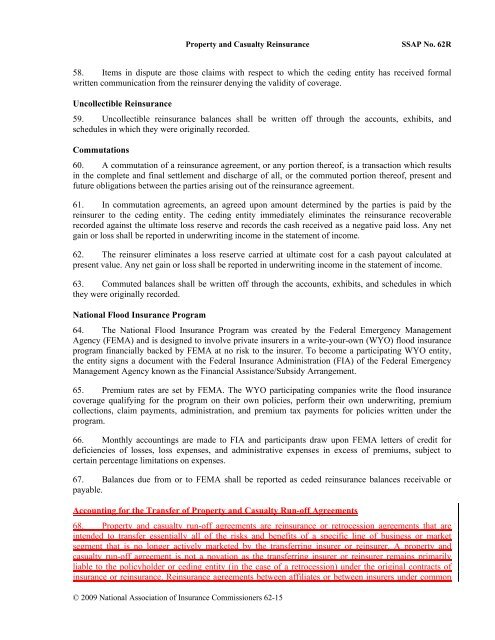
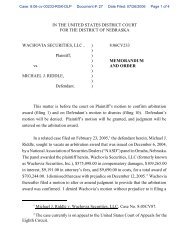
![202 Folio No 734 Neutral Citation Number: [2006] EWHC 1345 (QB ...](https://img.yumpu.com/50015000/1/184x260/202-folio-no-734-neutral-citation-number-2006-ewhc-1345-qb-.jpg?quality=85)
